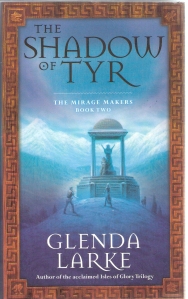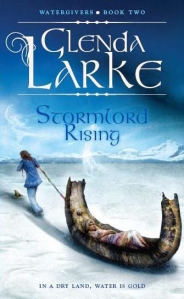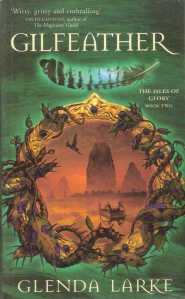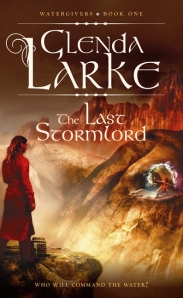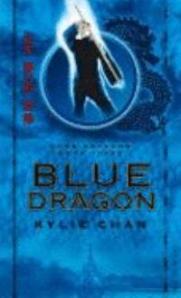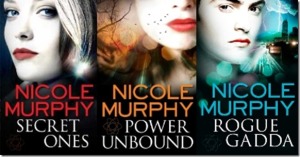As the next of my series featuring fantastic female fantasy authors (see disclaimer) I’ve invited the talented Deborah Kalin to drop by.
Watch out for the give-away question at the end of the interview.
Q: Your manuscript sold from the slush pile to Louise Thurtell during one of her Friday Pitch sessions. This must have been thrilling. Can you tell us a little about the path to publication for your fantasy trilogy The Binding? Did you belong to a writing group?
I can’t remember if I was still a member at the time of the sale, but before attending Clarion South I was a member of the Online Writing Workshop, a fabulous internet writing community that I’d highly recommend.
I first heard of the Friday Pitch shortly after finishing Shadow Queen. What appealed to me was the chance to submit a chapter of my manuscript (as opposed to simply a query letter), and the fast response time of a week (as opposed to anywhere from 3-24 months).
The first response landed exactly a week after I’d submitted — a request for more time, since Louise had been on holidays and hadn’t started on last week’s submissions yet. I remember thinking that was just a whole week longer that I didn’t have to research which market to submit to next.
The second response came a week later — and I didn’t open it until the next day, I was so sure it would be a rejection. Instead it was a request for the full manuscript. Suddenly all my powers of blasé disappeared!
I didn’t have to wait long, however. Louise called me when she was a quarter of the way through the manuscript, wanting to make sure I hadn’t sold it to anyone else. Two days later she called again. She was ten pages from the end, and she was going to take the book to the acquisitions meeting so she could make an offer, and did I have an agent she should be talking to?
I don’t think I made a single coherent noise for at least a month afterwards.
Q: You used to work as a chemical engineer. Are you tempted to write hard SF?
Science fiction, definitely; hard SF … yes and no.
I have a handful of SF novels jostling in my head, just waiting for their turn to be written. But I’ve noticed my stories are always very character-driven, so any SF I do end up writing will probably be more correctly described as soft or social SF. The only way technology would get a starring, centre-stage role is if the world I was writing about featured a type of technology that was a character in its own right.
 Q: In a review on Specusphere the reviewer said: ‘Told in the first person by Matilde, who but for her grandmother’s tenacity would, by the time the book starts, already be Duenin of the landlocked country of Sueben, Shadow Queen is a fantasy that keeps the reader on edge and looking over one shoulder for an attack or a betrayal.’ It is unusual to tell a trilogy from first person. Did you find this a challenge?
Q: In a review on Specusphere the reviewer said: ‘Told in the first person by Matilde, who but for her grandmother’s tenacity would, by the time the book starts, already be Duenin of the landlocked country of Sueben, Shadow Queen is a fantasy that keeps the reader on edge and looking over one shoulder for an attack or a betrayal.’ It is unusual to tell a trilogy from first person. Did you find this a challenge?
Absolutely. My default choice for point of view is third person, so that comes a bit more naturally to me than first. But Matilde is the character who loses the most, time and again, and she’s the character with the most at stake from the outset. The story was so thoroughly hers that first person felt like the best — maybe even only — option.
It leads to difficulties in keeping the reader up-to-date on what’s happening when Matilde isn’t on-scene, of course. To be included those scenes have to be related to Matilde, which brings up so much potential for telling rather than showing, and also for the readers to mistake Matilde’s sometimes-unreliable perceptions as the literal truth of what happened.
Q: The Binding books elicited quite a strong reader reaction on the issue of Matilde’s decisions. Infuriating is a word that crops up often. Can you tell us a little more about that?
One of the things I wanted to do, with Matilde’s story, was to create a believably flawed character. I also wanted to explore the issue of powerlessness, and making mistakes, and what that does to a person.
The fantasy genre is full of the boy king (or girl queen) trope: the youngster catapulted into leadership, for one reason or another. And time and again what I saw with this trope was that said youngster performed admirably. If they did put a foot awry, it often didn’t have a serious bearing on the plot.
Apart from being clichéd, and smacking of society’s obsession with youth and celebrity, it’s also painfully unrealistic. An untried young person thrust into a position of power or influence or even just high visibility is going to make mistakes, and those mistakes are going to cost them dear. To anyone watching from the outside, from an experienced perspective, that young person may even seem bleedingly stupid.
Matilde is 19 at the start of Shadow Queen. She’s untested and, though she’s educated in the ways of politics, she’s also been sheltered from it. She’s impatient, in the way of youth. Her main strength is simultaneously a weakness: she thinks on her feet, and she decides fast. She doesn’t second-guess, she just commits.
So when she’s tested, and sorely tested at that, she doesn’t always get it right.
But Matilde isn’t just young, impatient and decisive — she’s also powerless. She’s a prisoner of war, fighting for her life, and she’s doing it almost entirely alone. So her decisions are sometimes not to win so much as to survive — and maybe change the playing field to her advantage in the process.
I think that combination is inevitably going to lead to some infuriating decisions! Hopefully, though, they’ll also be understandable in the wider context of the story.
My favourite characters are the deeply flawed. Too often strength, particularly in relation to female characters, can be interpreted or portrayed quite narrowly. There’s a fabulous post about “why strong female characters are bad for women” with which I wholeheartedly agree.
Q: You attended Clarion South, a six week intensive bootcamp for writers. Can you share this experience with us?
Clarion South was simultaneously exhilarating and exhausting. I remember getting to bed around 1-2am, and rising around 6am, every single day for 6 weeks. In the afternoon I’d take a nap — which was strictly 10 minutes, no longer. (When the alarm woke me out of that nap, it was inevitably to a strong urge to throw up). The sleep debt was so severe that when I got home, I spent the next fortnight sleeping 12-13 hours a night, and taking a 5 hour nap during the day.
It was worth it. The chance to spend 6 weeks in a world where writing wasn’t a luxury but instead a priority was amazing. I found a community while I was there, and that in itself was invaluable — but I also found validation of what I wanted most to do with my time, which was write. At Clarion, no one expects you to put your writing second, or squeeze it in at the end of the day, or put it off or skip it “just this once”. Instead, writing dictates and informs every waking second: talking about the craft, pulling apart your classmate’s stories, having them pull yours apart.
I learnt so much at Clarion I think I spent the next year unpacking it all. Sometimes I still feel like I’m writing with the voices of my classmates in my head, banning me from using “just”, telling me the story starts on page 3, that sort of thing. There’s no way Shadow Queen would have emerged from my head in publishable format so swiftly if it wasn’t for what I learnt from my time at Clarion.
 Q: Book one: Shadow Queen and Book two: Shadow Bound are published by Allen and Unwin. I love this line:
Q: Book one: Shadow Queen and Book two: Shadow Bound are published by Allen and Unwin. I love this line:
‘The story of an unbreakable young woman, The Binding is a study of what defines us, what binds us, and what sets us free.’ Did the first book come out before the second and third were written? Has this proved a challenge because you can’t go back and tweak events in book one to match up with the way the plot has gone? Or do you plan your whole trilogy before you start writing?
I’m definitely a pantser, rather than an outliner. When I sold Shadow Queen and Shadow Bound to Allen & Unwin, SQ was finished but I’d barely started SB.
I wasn’t too worried, because even when I started writing The Binding books, I knew the ending, down to the closing line. So I’d written SQ with an eye towards that ending, and all I had to do in SB was … get there.
This was not quite so straightforward as I’d hoped, of course. (The inevitable lament of the pantser!) Most notably because the plot of SB hinges on Matilde’s vow at the end of SQ, and when I reached the critical moment where Matilde has to face the consequences of that vow and attempt to untangle it, I found myself utterly stuck. The simplest, easiest and most elegant solution was to go back to SQ and change one word of the vow, swap it out for a more apt synonym. But that simply wasn’t an option.
Luckily as a pantser, I’m very practiced at writing without headlights, and I trust my process. Even when it looks like I’m veering away from the ending and I can’t see a way back, or through, the story always ends up where I thought it would — only now it makes more sense. It took a lot of cursing myself, and false starts, but in the end I came up with an alternative solution to that tricksome tangle which I think worked better — so much better that now I can’t remember what it was I originally wanted to change.
These days, perhaps because of that experience, I find I’m tending a little more towards some level of outlining. I’ll probably never be one of those writers with a beat-by-beat outline, but the current work in progress at least has a synopsis to guide me. Although I’ve already departed from it. Oops.
Q: What will you be writing next?
I’m currently working on an urban fantasy about time-travelling faeries and loneliness, which has taken a lot longer than I expected or hoped but I think I have the plot worked out at last. I also have a synopsis-type outline for a third Binding book, which is currently with A&U. I also want to work on something that deals with mental illness in the near future, but I haven’t quite got the idea fleshed out yet.
Q: I was prompted to start this series of interviews because there seems to be a perception in the US and the UK that fantasy is a bit of a boy’s club. Do you think there’s a difference in the way males and females write fantasy?
I find rules breed exceptions!
I also think that what informs an author’s writing — at least in terms of tone, voice and style, if not content — are deeper issues such as education levels, socio-economic influences, the cultures to which that author has been exposed, and the range (or narrowness) of their experiences and opportunities in the world to date. To name but a few.
It’s impossible to separate some of those from a society’s gender roles, so superficially it seems inevitable that there will be some kind of noticeable difference in the writing of men and women that can be traced to gender. But I think that risks ignoring the larger picture.
Certainly I can’t pick an author’s gender simply from a sample of their writing.
 Q: Following on from that, does the gender of the writer change your expectations when you pick up their book?
Q: Following on from that, does the gender of the writer change your expectations when you pick up their book?
I think it used to – when I was a teen, I learnt to expect male protagonists from male authors, and vice versa. But I’m happy to say I don’t think that’s been true for a long time (if it ever was — my expectations could well have had more to do with the books I was exposed to during those years). These days I don’t even notice an author’s name except to note whether I’ve heard of their work before.
Q: And here’s the fun question. If you could book a trip on a time machine, where and when would you go, and why?
DINOSAURS! To bring one home with me, of course.
Although, to be entirely honest – I think I’d hijack the machine so I could take as many trips as I could possibly ever imagine.
Give-away Question:
Who is your favourite fictional character, and why?
Follow Deb on Twitter: debkalin@twitter
See Deb’s Blog.





